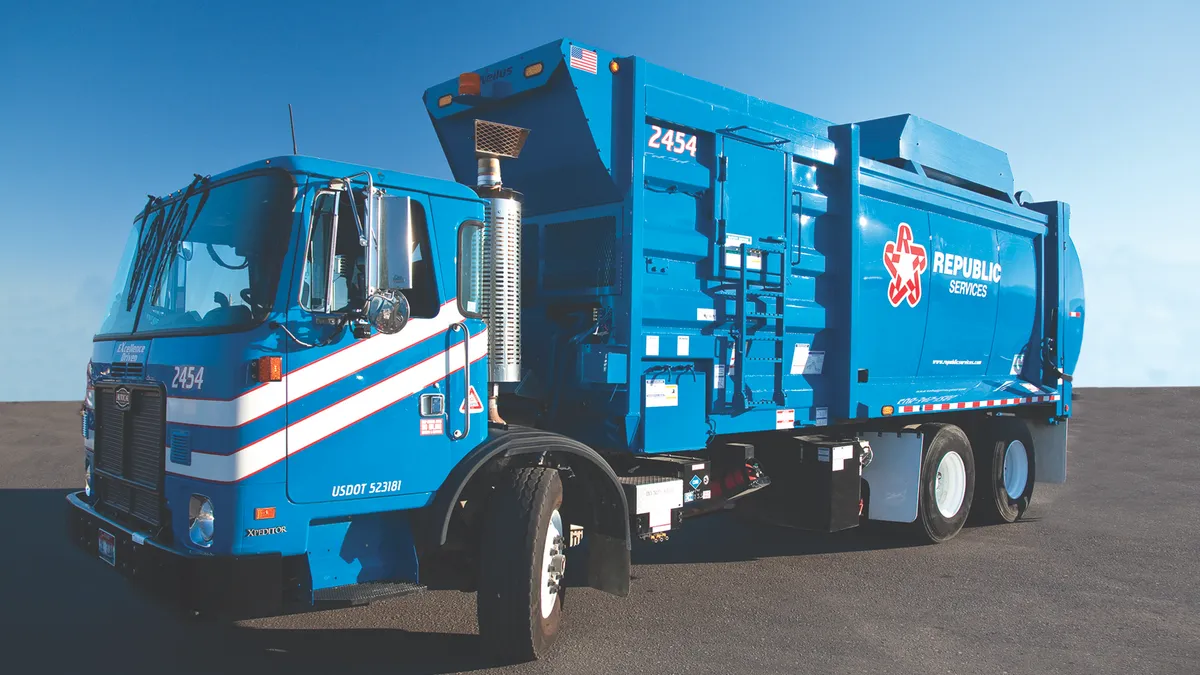Dive Brief:
- Republic Services CEO Don Slager said his company "will benefit substantially" from the new corporate tax cut and expects to see $190 million in cash tax savings this year, according to the fourth quarter earnings call. The company plans to spend about $200 million on fleet and facility upgrades to strengthen employee retention and safety. This will begin with $25 million in the upcoming year.
- The company's annual earnings release reported $437 million was spent on acquisitions in 2017. Republic anticipates spending $150 million on tuck-ins this year, and doesn't think the tax cut will directly lead to increased activity because smaller family businesses may not always see a clear benefit unless they're already looking for an out. "These people have put their heart and soul into it, they've built really nice businesses, and they're not just going to walk away from them just for a couple of percent," said Slager.
- Average commodity revenues, excluding glass and organics, were down 7% in the final quarter and 85% of processing volumes are now on a fee-based model. Republic feels China's effects have been "isolated" because only 10% of its OCC now goes there. New markets have also been found in Europe and Asia. "Our customers have told us recycling is important to them and have demonstrated their willingness to pay," said Slager.
Dive Insight:
Republic's numbers were positive. Fourth quarter revenue was approximately $2.6 billion, up 7.6% YoY. Total revenue for 2017 was $10 billion, up 7% from 2016. This upward trend was reinforced by the company's board approving a $2 billion increase in its share purchase reauthorization in October.
Heading into 2018, Republic "expects to return approximately $1.2 billion of total cash to shareholders through $450 million in dividends and $775 million in share repurchases." The company is also projecting an 18% increase in free cash flow outlook due to the tax cut.
Though that doesn't mean Republic will be following Waste Management's approach of giving bonuses to employees. CEO Jim Fish recently described this measure as being about employee retention and good for shareholders as a result. According to industry analyst Michael E. Hoffman, this may also be because the company has a higher turnover rate than its competitors.
Slager said Republic's wages and benefits have already been competitive, even during the recession, so the company would address retention from a different angle. He believes the investment in new vehicles, particularly at locations where outdated models came with tuck-ins, will improve morale.
"That's going to be good for our productivity, our safety, good for our frontline people, because, as you know, the office that our drivers have is their truck," Slager said. "So our drivers should love that."
On the facility side, this will mean investments in break rooms, training facilities and locker rooms — especially for what was described as a growing number of women drivers.
As for China, Republic's comments echoed what was said in the third quarter call about confidence in bale quality. None of the financial analysts asked for specific details on facility upgrades to meet tighter standards and Slager didn't focus as much on contamination as some of his competitors have recently.
"We always do produce a pretty good quality product. And so our recycle bales, et cetera, are pretty easy to move. We've never had to inventory material," Slager said. "We've never had to landfill material."
While not directly linked to quality issues, Republic has in fact had to dispose of recyclable material in recent months. The company received a disposal concurrence from the Oregon Department of Environmental Quality in Nov. 2017 and a similar waiver from the Massachusetts Department of Environmental Protection last month. Both states have experienced capacity crunches due to a variety of factors, including slower line speeds.
The only other notable surprise in this call was the fact that no mention was made, positive or negative, of Republic's involvement in the RecycLA commercial waste franchise system. The company's Los Angeles representative was one of multiple people to be grilled by local council members over the many transition issues at a lengthy hearing earlier this week.
While RecycLA opponents have talked of liquidated damages, or even canceling contracts, this doesn't seem to have registered to the point of being a major financial concern. None of the analysts asked about it during the call and the company's SEC filing didn't cite the future of its Los Angeles business as a potential risk factor.















